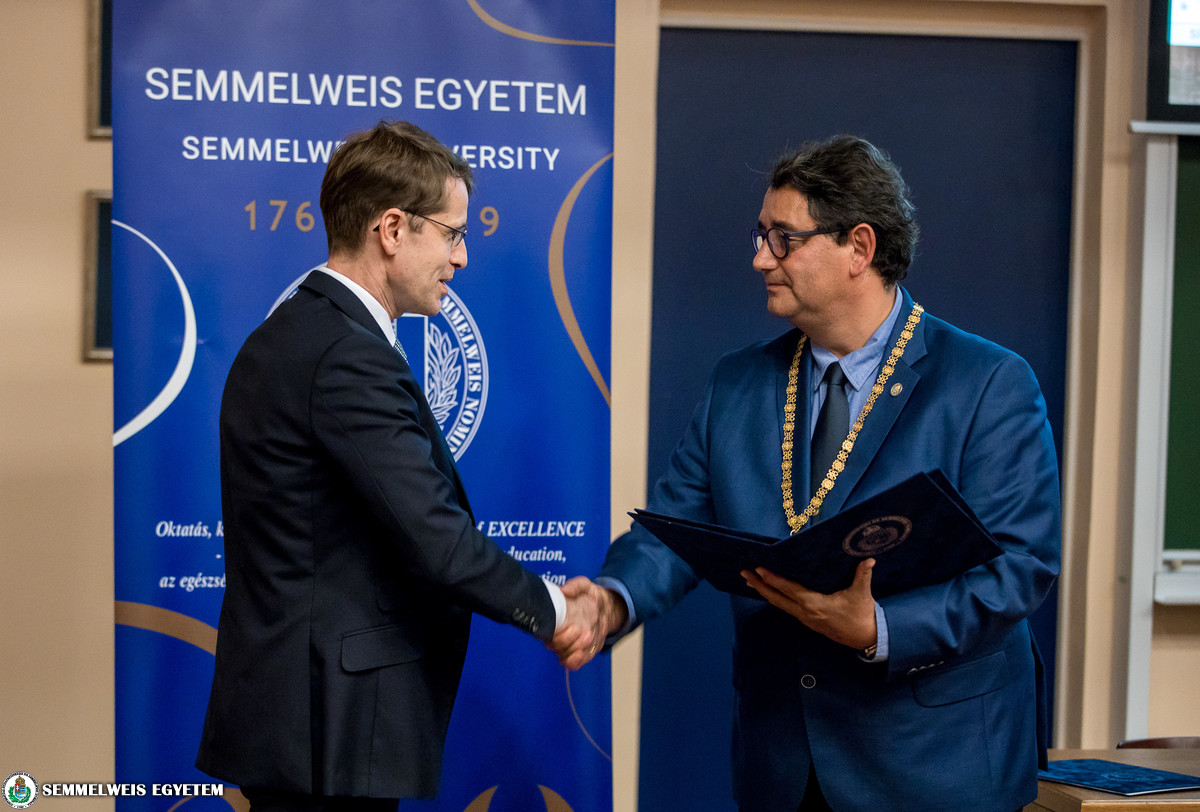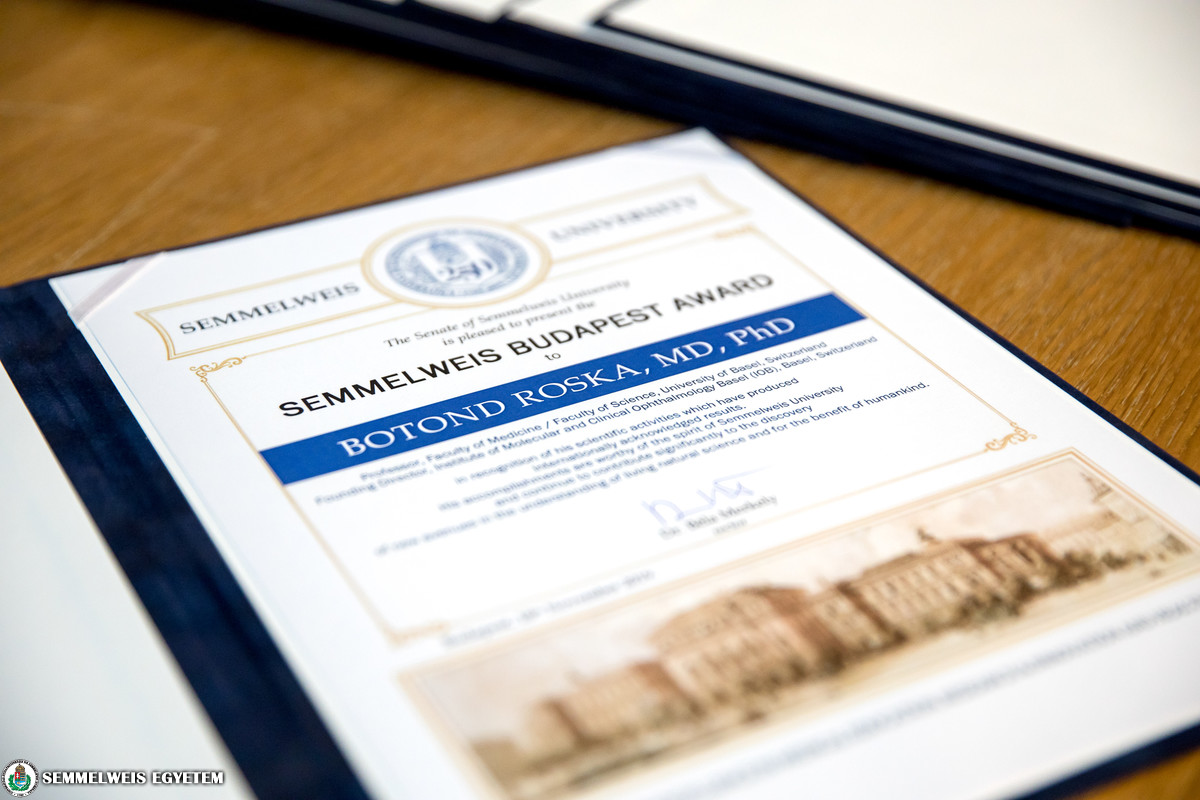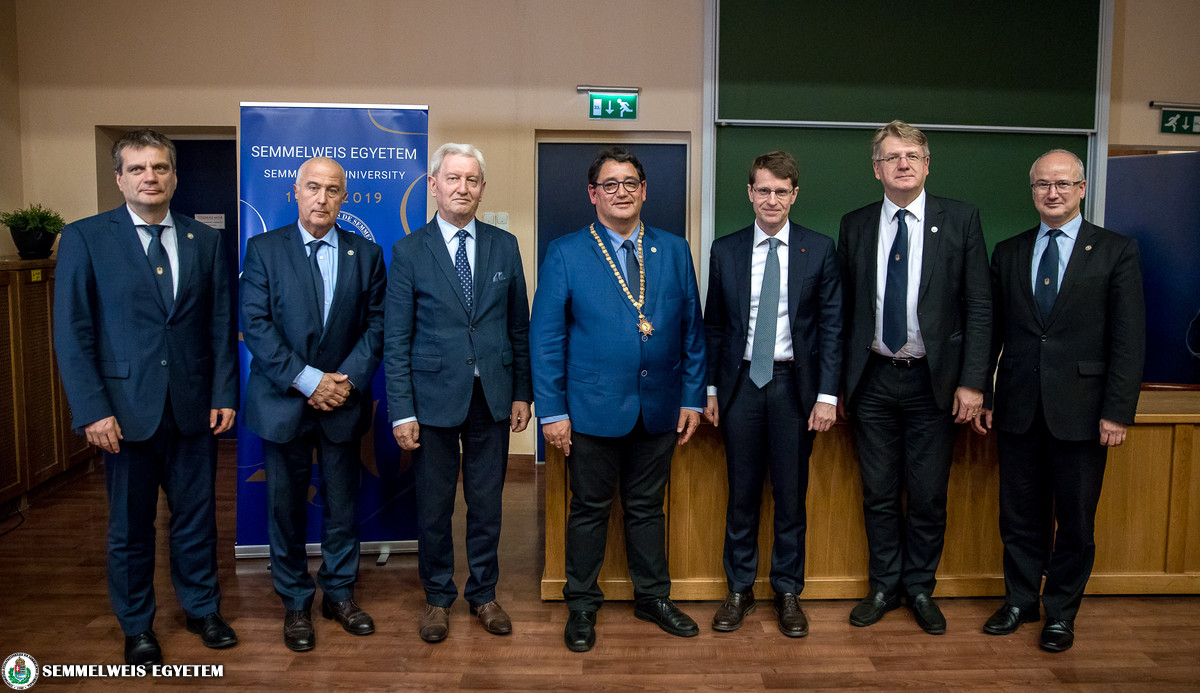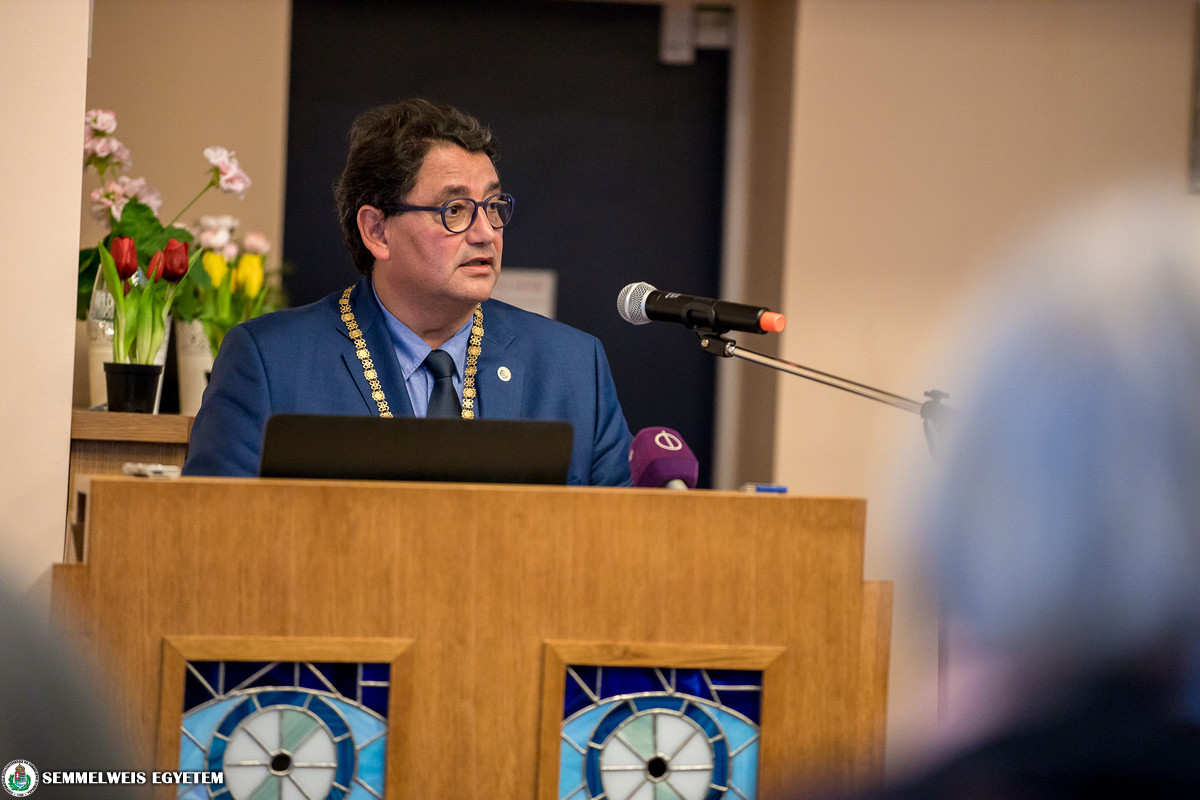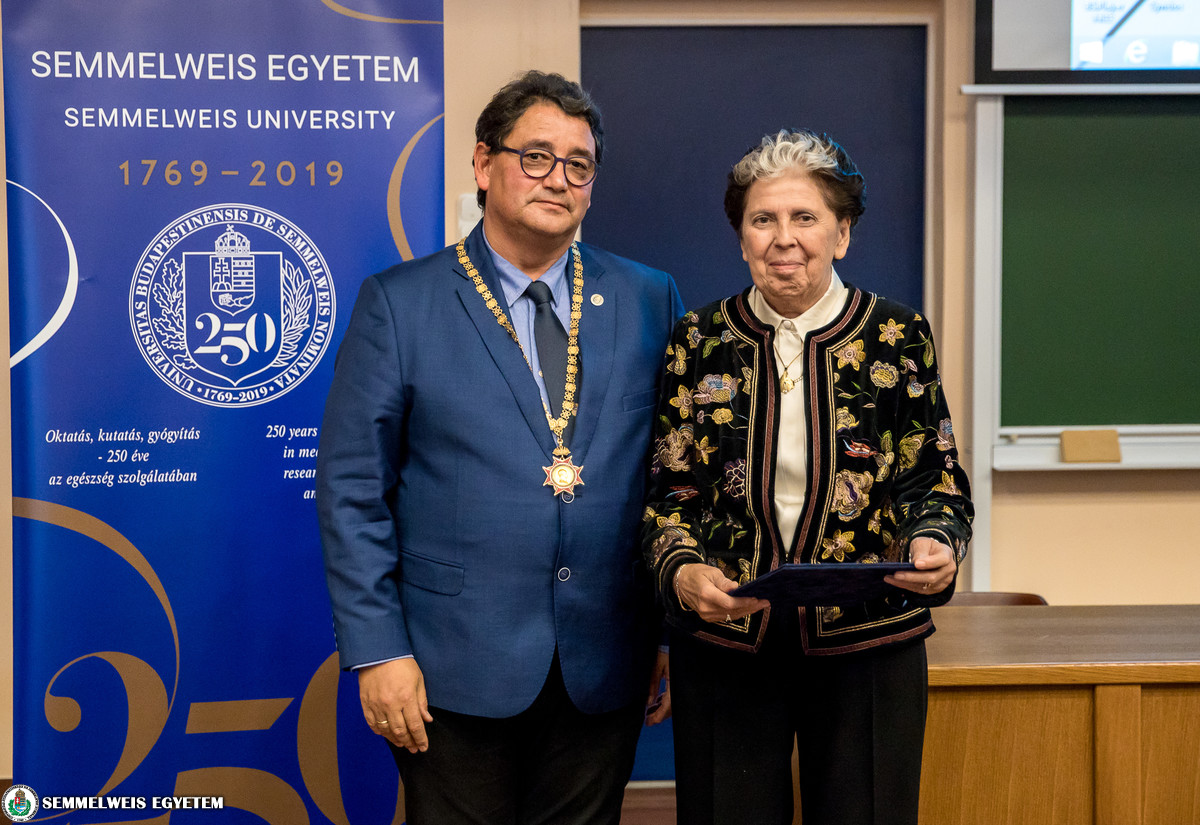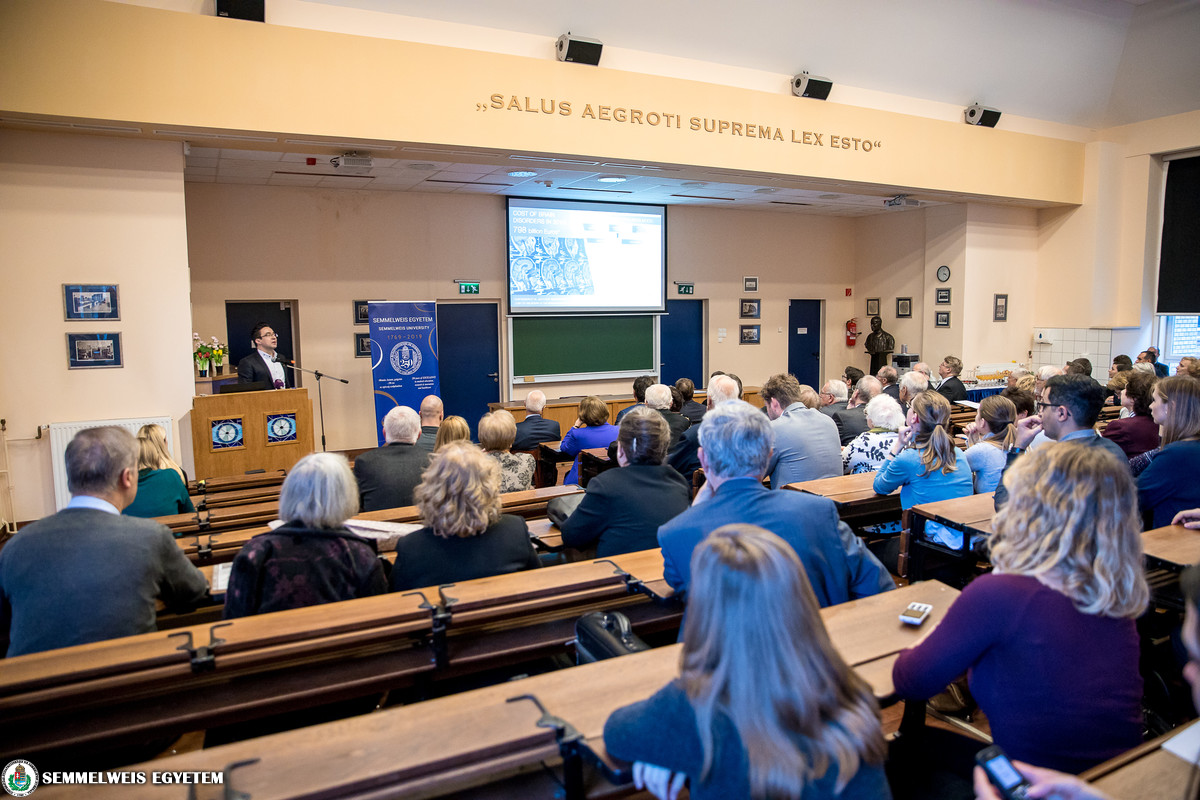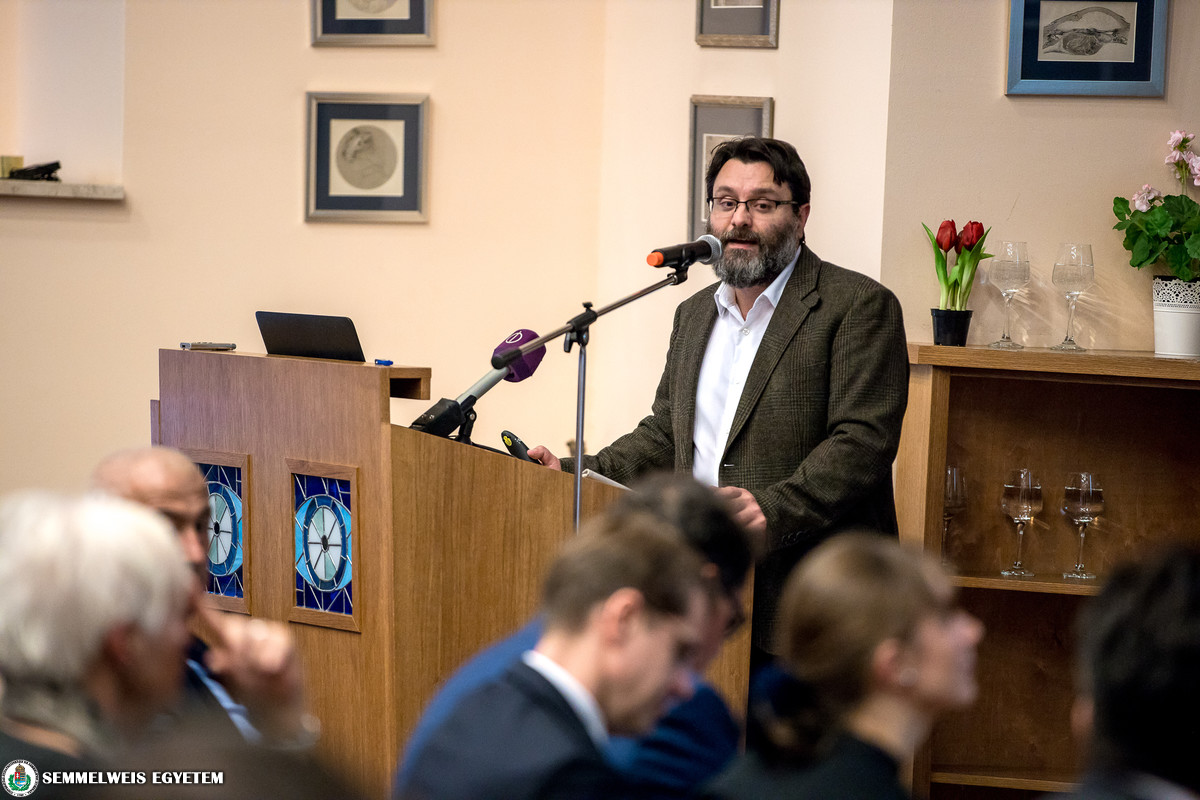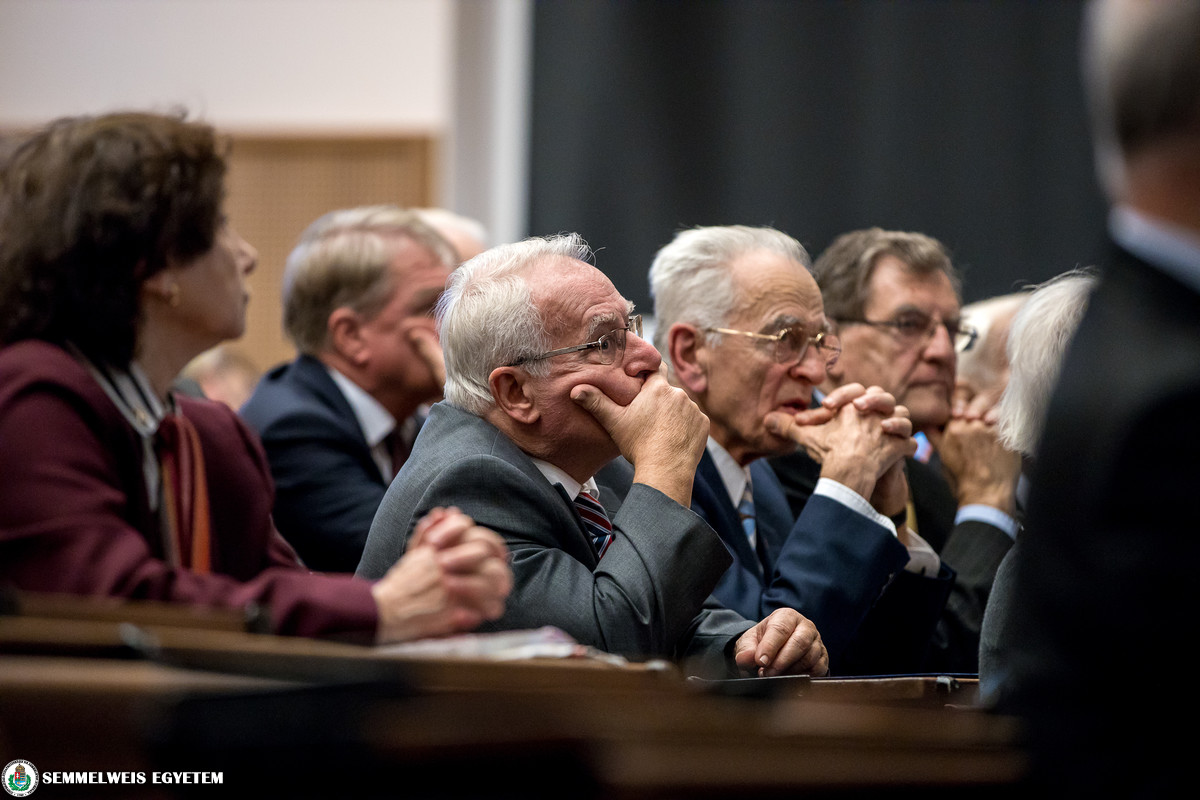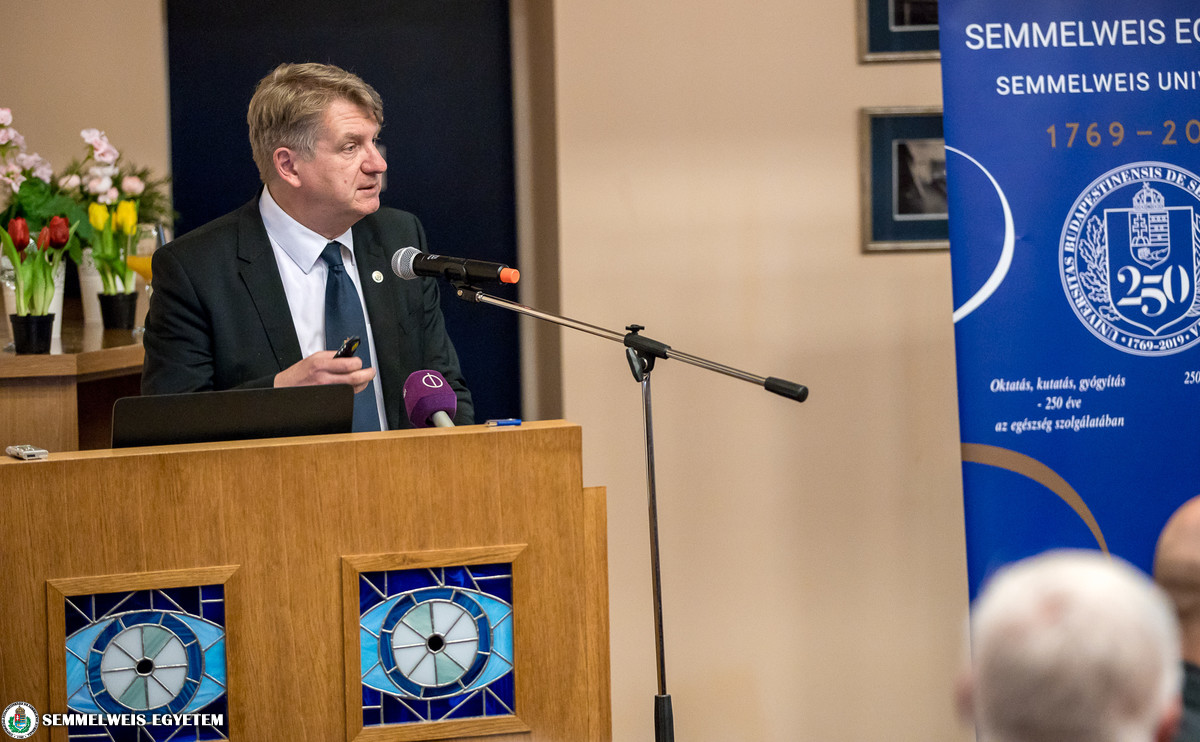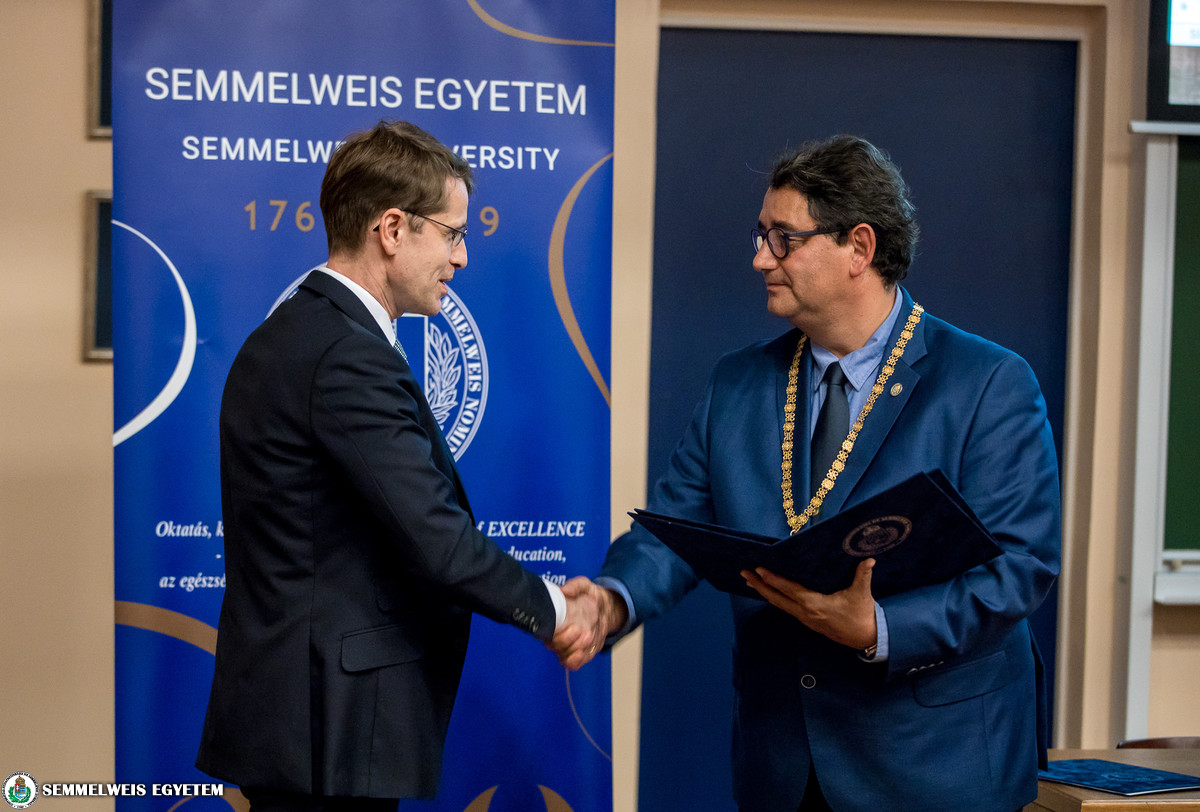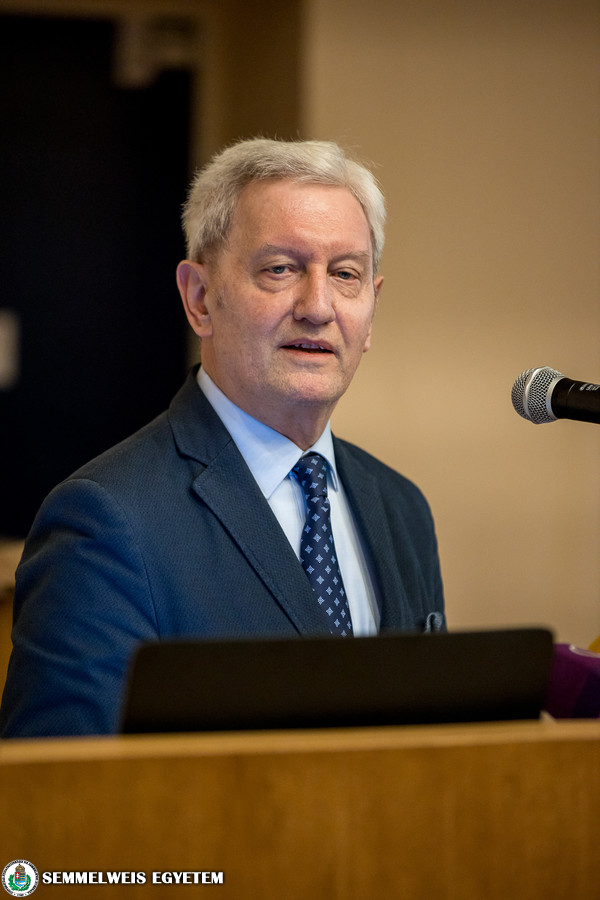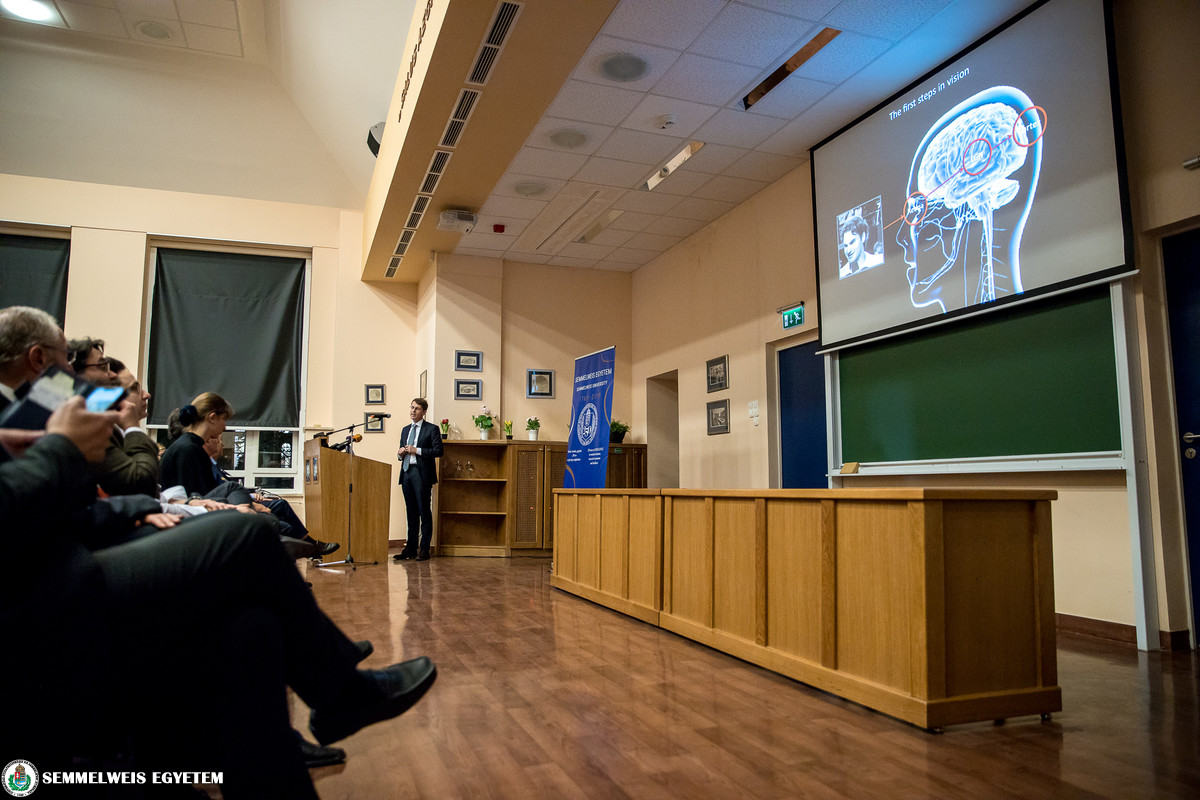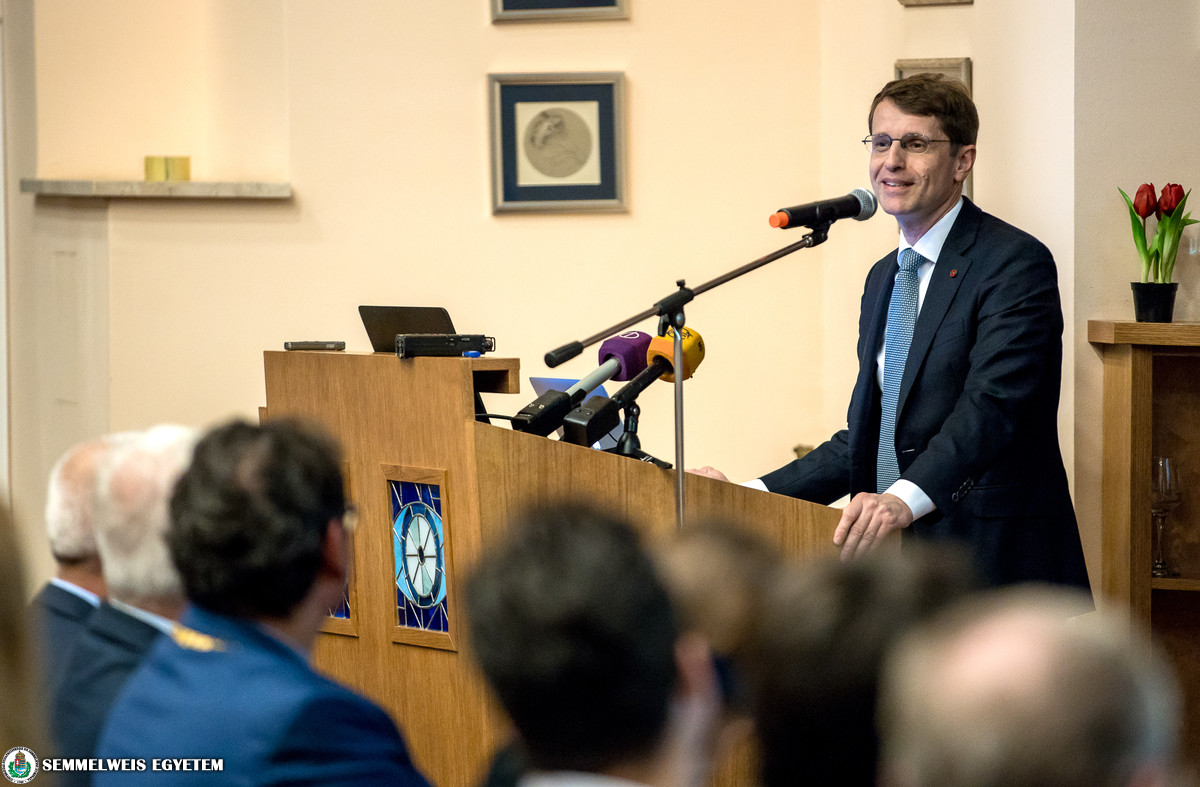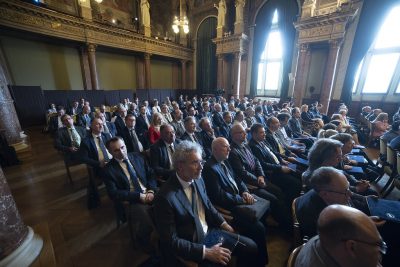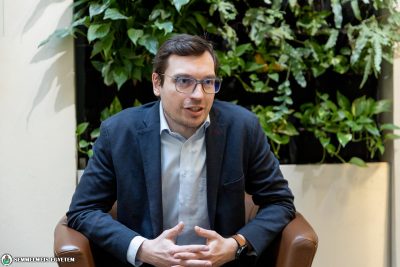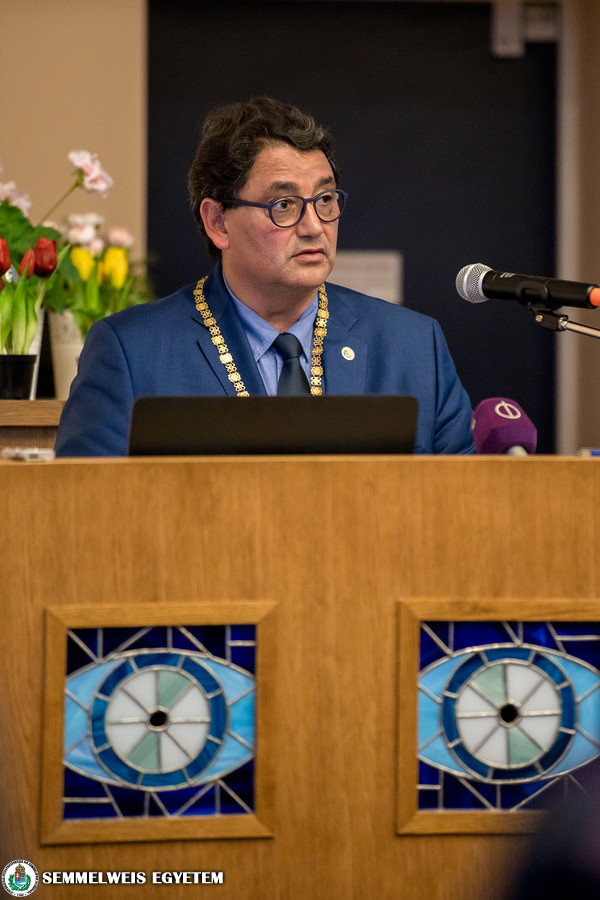 This is the 10th occasion that Semmelweis University, which is celebrating its 250th anniversary this year, is presenting its most prestigious international recognition, the Semmelweis Budapest Award, said rector Dr. Béla Merkely in is opening speech. He pointed put that the award, established in 2009, is awarded to internationally renowned scientists working in the area of natural science whose achievements provide new perspectives and serve the benefit of humanity. The first recipient of the Semmelweis Budapest Award in 2010 was Dr. Jeremy K. Nicholson, who was followed by Sir George Radda, Dr. Péter Somogyi, Dr. György Oláh, Dr. György Klein, Dr. Tomas Hökfelt, Dr. Stefan W. Hell, Sir Ravinder N. Maini and Dr. Petr Widimsky. All of them are exemplary, highly renowned scientists in their fields who achieved results that provide answers to global health problems, the rector noted. He announced that the 2019 Semmelweis Budapest Award was awarded by the Senate to an outstanding research doctor whose alma mater is Semmelweis University. Dr. Botond Roska’s pioneering gene therapy experiments for restoring vision and his academic work not only provide hope for a new quality of life for patients, but also contribute to increasing the recognition and good name of Hungary and Semmelweis University both at home and abroad. “His work embodies the translational approach that is the future and which is the leading strategic priority of our university,” the rector added.
This is the 10th occasion that Semmelweis University, which is celebrating its 250th anniversary this year, is presenting its most prestigious international recognition, the Semmelweis Budapest Award, said rector Dr. Béla Merkely in is opening speech. He pointed put that the award, established in 2009, is awarded to internationally renowned scientists working in the area of natural science whose achievements provide new perspectives and serve the benefit of humanity. The first recipient of the Semmelweis Budapest Award in 2010 was Dr. Jeremy K. Nicholson, who was followed by Sir George Radda, Dr. Péter Somogyi, Dr. György Oláh, Dr. György Klein, Dr. Tomas Hökfelt, Dr. Stefan W. Hell, Sir Ravinder N. Maini and Dr. Petr Widimsky. All of them are exemplary, highly renowned scientists in their fields who achieved results that provide answers to global health problems, the rector noted. He announced that the 2019 Semmelweis Budapest Award was awarded by the Senate to an outstanding research doctor whose alma mater is Semmelweis University. Dr. Botond Roska’s pioneering gene therapy experiments for restoring vision and his academic work not only provide hope for a new quality of life for patients, but also contribute to increasing the recognition and good name of Hungary and Semmelweis University both at home and abroad. “His work embodies the translational approach that is the future and which is the leading strategic priority of our university,” the rector added.
The ceremony began with 12 retiring professors of the university being awarded titles of professors emerita and emeritus, based on a decision of the Senate made in honor of the current anniversary year. The certificates were presented by rector Dr. Béla Merkely to Dr. Dezsőné Horváth, Kahlichné Dr. Márta Simon, Dr. Éva Szőke, Dr. Erzsébet Temesvári, Dr. Dezső Frang, Dr. Béla Gömör, Dr. Zsolt Kelemen, Dr. Endre Ludwig, Dr. Tamás Machay, Dr. János Mihály Papp, Dr. György Salacz and Dr. Tibor Verebély.
This was followed by three Hungarian experts – including two from Semmelweis University – holding presentations, on their close collaboration with Dr. Botond Roska in certain segments of their common research.
Dr. Balázs Rózsa, group leader at the MTA Institute of Experimental Medicine and the Pázmány Péter Catholic University, and the founder and director of Femtonics, has been working together with Dr. Roska for more than ten years on developing various imaging technologies. In his presentation, he talked about human brain interfaces and how they can be used in restoring vision, noting that these machine interfaces serve to replace certain lost brain functions. He compared the goal of the project – projecting a virtual reality into the brain – to what moviegoers saw in the movie Matrix.
Dr. Arnold Szabó, an assistant lecturer at Semmelweis University’s Department of Anatomy, Histology and Embryology, presented the Retina Laboratory that he leads, where they have created a retina model that allows them to keep alive human post mortem tissue for several months; these can be used for gene therapy developments, pharmaceutical experiments, or even basic research. Regarding his five-year continuous cooperation with Dr. Roska, he said they were approached by the professor, as their above-mentioned human system proved suitable for testing and studying the gene therapy developments and research in his experiments.
Dr. Zoltán Zsolt Nagy, director of the Department of Ophthalmology, discussed the clinical aspects of the research activity. In his comprehensive presentation, he talked about genetic disorders of the retina, including retinitis pigmentosa, as well as Leber’s congenital amaurosis. Retinitis pigmentosa – which is the focus of their research – develops at a young age, causes a progressive degeneration of vision eventually leading to a complete loss of vision. The department is a national center for this disease, thus it can provide patients for Dr. Roska’s research, and when wider clinical experiments start, their Hungarian site will be the university department, noted the director.
Dr. Roska’s areas of study concentrate on five connected topics. His gene therapy experiments aimed at restoring vision are unique due to the direct translational opportunities they offer, as well as their significance from the point of view of patient outcomes and the national economy. The common cornerstone of these experiments are the development of synthetic adeno-associated virus vectors with which the therapeutic nucleic acid can be introduced in a targeted way to specific cells of the retina, said Dr. Béla Merkely among others in his laudation of the awardee.
After accepting the award, Dr. Roska held his scientific presentation, which he started off by thanking the university for this special recognition. He recalled that he was a medical student at this university, where he graduated from 24 years ago and he has tried ever since to put what he learned here into practice and to further the ideal of the medical university. “It is quite moving to receive an award from a community where a person’s roots are,” he said. Therefore, similarly to the Order of Saint Stephen award he recently received, this award will also have a special place in his heart.
In his presentation, Dr. Roska discussed his studies aimed at restoring vision, focusing primarily on how acquired knowledge can be put to use in therapy. He called it a paradigm shift that thanks to the technologies developed they are able to experiment on human retinas. This is especially significant because experience shows that in the case of gene therapy, the results of animal experiments cannot be transferred to human studies. He also mentioned that some experiments have reached the clinical testing phase – in one out of the four types of optogenetic therapy methods, five patients have been injected with the virus in London and Paris. The first experiments will inform about the safety of the therapy, which will be followed by testing their efficiency. He also spoke about the plans for the future, which involves the development of a method that would help not only those with full loss of vision but also those suffering from visual impairments.
Following the presentation of Dr. Roska’s award a brief address was made by Dr. József Bódis, state secretary for knowledge and innovation management, representing Minister for Innovation and Technology Dr. László Palkovics. “Today’s ceremony represents everything that we believe about renewing Hungarian higher education, science and innovation in Hungary, and strengthening its competitiveness,” he said. He highlighted the significance of this year’s Semmelweis Budapest Award recipient being committed during his career to the country and cooperating with the research group of Semmelweis University to provide innovative solutions to the real challenges of life. He also emphasized the significance of the ongoing Science Park project, which will be able to be transformed flexibly to fit the needs of industry. The concept of the joint Health Industry-Biotechnology Science Park project of Semmelweis University, the Pázmány Péter Catholic University and the National University of Public Service was first formed by the father of the recipient, Dr. Tamás Roska, who died in 2014.
As part of the ceremony, Dr. Roska – based on the proposal of the Faculty of Medicine and the Department of Ophthalmology – also received a commission as visiting professor of Semmelweis University, as of December 1, 2019. In the future, Professor Roska’s institute will cooperate with the Department of Ophthalmology and the Department of Anatomy both in research and, following the final development of the medicinal product, in the treatment of patients, said director Dr. Zoltán Zsolt Nagy.
For more photos of the event, including all the awardees, see the full gallery in our Hungarian article.
Pálma Dobozi
Translation: Tamás Deme
Photo: Attila Kovács – Semmelweis University
Video: Eszter Keresztes; Totalsight
